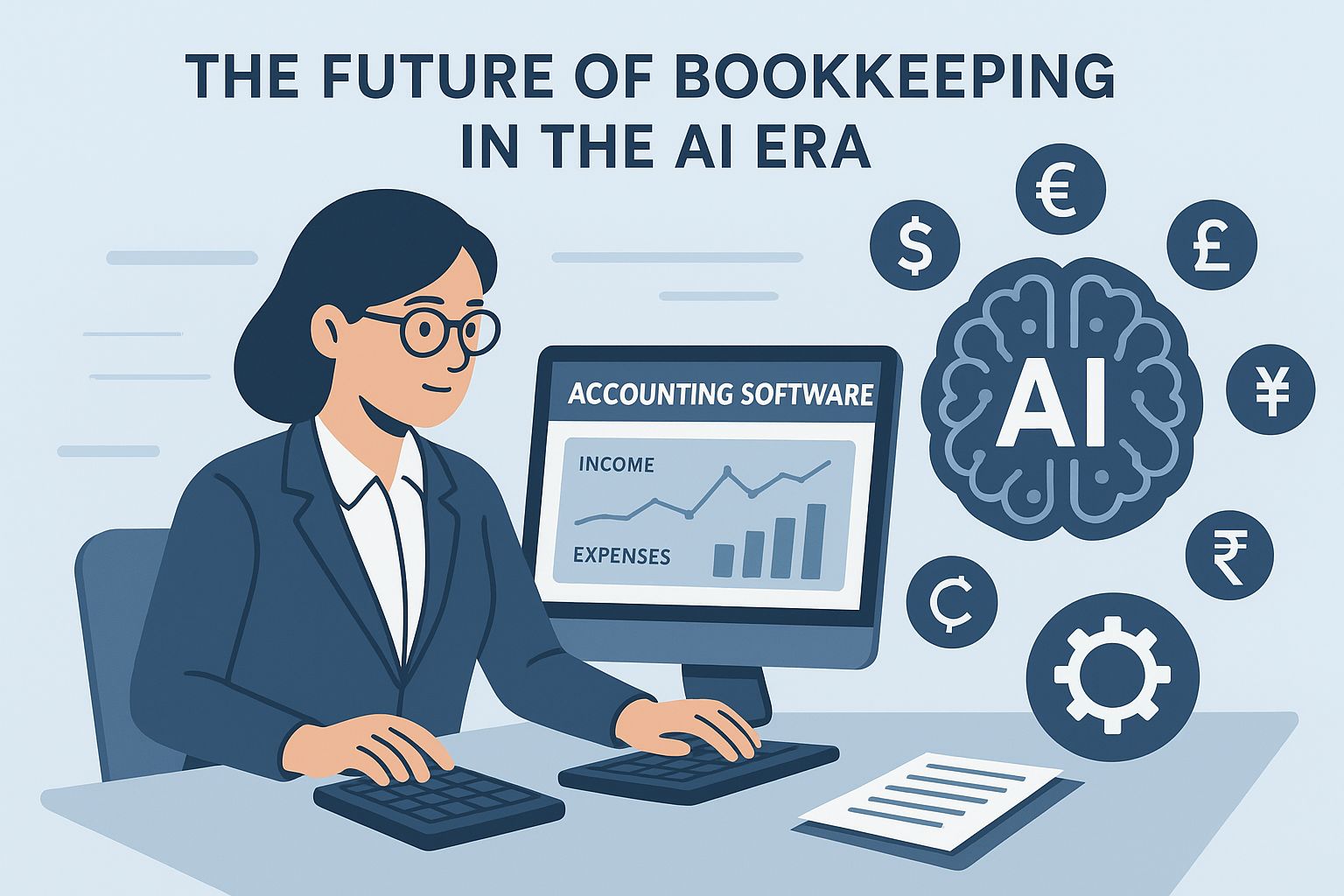Walk into any modern accounting firm or bookkeeping company today, and you’ll likely see less paper, fewer spreadsheets, and a lot more automation.
Artificial intelligence (AI) has quietly and quickly become part of the financial backbone of thousands of businesses. Whether it’s auto-categorizing transactions, reconciling bank feeds, or forecasting cash flow, AI bookkeeping isn’t a buzzword anymore, it’s the new normal.
But what does that really mean for bookkeepers? Are robots coming for the ledger? Not exactly. In fact, the future of bookkeeping looks brighter and more human than ever.
The Evolution of Bookkeeping: From Ledgers to Algorithms
Let’s rewind a bit.
Bookkeeping used to be about ledgers, literal books filled with handwritten numbers, checked and double-checked by human eyes. Then came spreadsheets like Excel, which revolutionized how we stored and analyzed data.
Cloud-based platforms like QuickBooks Online, Xero, and FreshBooks took it even further, making financial records accessible from anywhere.
Now, we’re entering the next phase: AI bookkeeping.
The difference? AI doesn’t just record numbers, it learns from them. It recognizes patterns, predicts future trends, and even makes suggestions. What used to take hours (or days) of manual data entry can now be done in minutes, accurately and at scale.
Just like spreadsheets didn’t eliminate bookkeepers, AI won’t either. Instead, it’s transforming what bookkeepers do, shifting the focus from transaction entry to strategy, insight, and value creation.
Trends Shaping the Future of AI Bookkeeping

The rise of AI in finance is not random, it is driven by a few big trends reshaping how businesses handle money.
1. Automation of Repetitive Tasks
Data entry, reconciliation, and categorization are being automated through machine learning algorithms that “learn” from past entries. Tools like Dext and Hubdoc can scan receipts, extract data, and sync it directly into accounting systems with stunning accuracy.
2. Smarter Financial Forecasting
AI tools now analyze historical data to project future outcomes. They can predict when cash flow might dip, when invoices are likely to be paid late, and even suggest budget adjustments, all powered by machine learning accounting.
3. Real-Time Insights
The days of waiting until month-end to see financial results are fading. Cloud platforms with built-in AI features offer live dashboards i.e. Power Bi that show a business’s financial health at any moment, enabling faster, smarter decisions.
4. Integration Across Systems
AI bookkeeping thrives when systems talk to each other. Payroll, CRM, invoicing, and even inventory management tools now integrate seamlessly, providing a unified financial ecosystem. This cross-platform data exchange fuels better reporting and automation.
5. Data Security and Compliance
With automation comes responsibility. AI is now being used not just for number-crunching, but for fraud detection, audit trails, and compliance monitoring. Machine learning models can spot unusual transactions in real-time, something humans might miss.
How AI and Machine Learning Accounting Tools Are Transforming the Industry

To understand the impact of AI bookkeeping, let’s look at how it’s being applied in real-world accounting tools.
QuickBooks AI: Smarter Categorization and Insights
Intuit’s QuickBooks has integrated machine learning to automate expense categorization and bank reconciliation. Over time, it learns from user behavior, meaning the more you use it, the smarter it gets. For small business owners, this means less time on data entry and more time on decision-making.
Xero: Predictive Analytics and Cash Flow Forecasting
Xero’s AI-powered insights help businesses anticipate financial challenges before they happen. Its predictive features use historical data to project cash flow trends, helping users stay ahead of potential shortfalls.
Dext: OCR and Intelligent Data Extraction
Dext uses optical character recognition (OCR) combined with machine learning to scan invoices and receipts. The system learns to recognize vendor names, amounts, and tax rates, posting them directly into accounting software, eliminating manual input almost entirely.
Internal AI Tools Used by Firms
Many accounting and online bookkeeping firms are now developing in-house AI tools for repetitive workflows. Some use AI to identify client spending anomalies, while others build dashboards that combine data visualization with predictive insights.
In every case, AI is doing one thing exceptionally well, freeing up time for bookkeepers to focus on advisory work, the strategic, human side of finance that clients truly value.
Human–AI Collaboration: Empowering, Not Replacing, Bookkeepers

Let’s be clear, AI is not here to steal jobs. It’s here to handle the grunt work. The best bookkeeping firms are already seeing this as an opportunity to upskill and add value rather than compete with technology.
Think about it this way:
- AI can process thousands of invoices in seconds.
- But AI can’t interpret the story those numbers tell, or explain them to a business owner in plain English.
- It cannot build relationships, provide reassurance, or navigate the nuances of client goals.
That is where humans shine.
AI bookkeeping is about collaboration, not competition. Bookkeepers who embrace AI tools are becoming more efficient, analytical, and strategic. They’re evolving from “data recorders” to “financial advisors.”
In short, AI takes care of the numbers so humans can take care of the business.
Practical Tips for Adopting AI in Bookkeeping

If you’re a bookkeeper or small business owner wondering how to start integrating AI into your workflow, here are a few practical steps:
1. Start Small with Automation Tools
Begin by using tools like Dext, Hubdoc, or QuickBooks Online’s automation features for data entry and reconciliation. You’ll quickly see the time-saving benefits.
2. Embrace Continuous Learning
AI tools evolve fast. Stay updated through webinars, certification courses, or training provided by accounting platforms. Many now offer “AI readiness” resources.
3. Focus on Data Quality
AI is only as good as the data it learns from. Make sure your inputs, receipts, invoices, bank feeds, are clean and consistent. Garbage in, garbage out still applies.
4. Use AI for Insight, Not Just Automation
Do not stop at automating tasks. Leverage AI reports and dashboards for forecasting, budgeting, and identifying business trends. This is where true value emerges.
5. Communicate the Human Touch
Clients may be wary of “AI doing their books.” Reassure them that technology enhances accuracy and speed, while you still provide the personal insight they trust.
Looking Ahead: The Future Is Collaborative

The future of bookkeeping in the AI era isn’t a sci-fi story about machines taking over. It’s a story about partnership, humans and AI working together to make financial management smarter, faster, and more strategic.
Imagine a world where your bookkeeping system automatically predicts cash flow dips months in advance, flags potential tax deductions, and even offers proactive advice, all while you focus on guiding your clients toward growth. That’s not a dream, it is already happening.
In the next few years, we’ll see even deeper integration of machine learning accounting, natural language processing, and predictive analytics. But one thing will stay constant: the need for human expertise to interpret, advise, and connect.
AI bookkeeping is not replacing bookkeepers, it’s elevating them.
Final Thoughts
As AI continues to evolve, so too will the role of the bookkeeper. Those who adapt, who learn to use AI as a powerful assistant rather than a threat, will thrive in this new landscape.
The message is simple. Don’t fear the AI era. Embrace it, train it, and grow with it. Because the future of bookkeeping is not about who is faster, it’s about who is smarter.
You May Like To Read:

